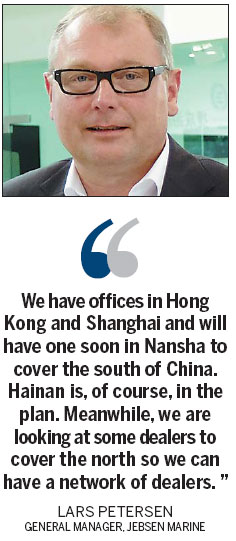Setting sail into uncharted waters
Updated: 2013-08-23 08:08
By Shi Jing (China Daily)
|
|||||||||||
|
An international yacht exhibition in Haikou, Hainan province. The China Cruise and Yacht Industry Association forecasts there will be more than 100,000 yachts owned by the Chinese within the next 10 years. Provided to China Daily |
Boat dealership plans to expand despite the downturn in the global economy
Putting your head into the center of the Dyson vacuum fan attracts customers to your stand at a trade fair, Lars Petersen, general manager of Jebsen Marine Division, told his young team members at the start of the China (Shanghai) International Boat Show earlier this year.
People might wonder why the Dyson fan is on show at the stand of the exclusive dealer of British luxury yacht brand Fairline. It turns out it is part of the package that international luxury distributor Jebsen Group has come out with this year. If you buy a boat, you get a Porsche car, wine and Champagne plus a Dyson fan. Petersen calls it "quite nice cross-branding".
From a quick look at Petersen's profile, it can be easily seen the package promoted this year is related to his 15 years of experience working for the Porsche side of business at Jebsen.
The 48-year-old went to Hong Kong in 1994 and started dealing on the Chinese mainland from 2004. The company opened its first Porsche Center in Beijing in 2001.
Now, as general manger of the marine division, a position to which he was appointed in 2010, Petersen is making use of the network he is proud to have built up.
"We go into the showrooms, talk to existing customers and introduce to them what other products we have. The customers in general feel confident because they know us and they have spent money with us," he says.
Although Petersen does not speak Mandarin, which he regrets, he claims to be "half-Chinese" and know very well how to deal with rich Chinese. The trick is to find a connection.
"I bet you drive a Porsche" is usually the patter that Petersen starts with when he first meets a customer. Once they know Petersen was involved in Porsche sales, the ice is broken.
"It's all about guanxi in China," he laughs, referring to a term which loosely mean "connections".

In the first three quarters of last year, Jebsen's marine division delivered eight yachts, hitting a record high of 1.5 vessels a month. To carry on the trend, Jebsen Marine has decided to open a new office at Nansha Marina, its third in China after Hong Kong and Shanghai.
Jebsen, a 100-year-old marketing and distribution company, is based in Hong Kong. It made a total revenue of more than HK$15 billion ($2 billion yuan) last year, from which the marine division is sure to have sought double-digit growth from the mainland, ever the focus of the group, says Petersen.
Jebsen has more than 2,000 staff in the region, including 900 in Hong Kong and 1,400 on the mainland. Because Petersen likes to work with the locals, all staff in his division are Chinese apart from him and one Belgian in Hong Kong who specializes in the yachts business.
"We have offices in Hong Kong and Shanghai and will have one soon in Nansha to cover the south of China. Hainan is, of course, in the plan. Meanwhile, we are looking at some dealers to cover the north so we can have a network of dealers. Last year, we set the goal of eight new dealers for the next three years. But this could change anytime."
The luxury brands industry in China has been affected by the central government's crackdown on extravagant government spending. Statistics provided by consulting firm Bain & Co show the growth rate of buying luxury products decreased to 7 percent last year, a huge contrast with the 30 percent increase over the past two years.
But Petersen does not show much concern because the company faced the same issues when trying to introduce Porsche into China. He understands that there will be ups and downs. So the company has chosen to look at the whole industry in the longer term, by which time the impact of the government's policy will be less evident.
"For the bigger boats, we are dealing with a very small clientele target group. Someone may be able to afford a boat costing 40 million yuan ($6.5 million). They might be less affected by the policy than somebody buying a luxury watch, if you know what I mean," he says.
Zhou Ting, head of the Fortune Character Institute, an organization that studies luxury purchases in China, says that high-net-worth Chinese make up 1 percent of the total population and they will be unlikely to be affected by the policy because "they have a rigid demand for luxury products".
The yachting market in China is booming. The China Cruise and Yacht Industry Association expects that there will be more than 100,000 yachts owned by the Chinese within the next 10 years.
At the moment, the pictures seen in promotions in which people take to boats for recreation is still a dream scenario mostly taking place in the West. The yachting industry is not yet regarded as leisure in a way Jebsen would like to see, Petersen says.
"The luxury boats are bought by companies. They buy these boats to show a certain status or wealth, or to use them to entertain customers or clients. Therefore, they prefer bigger boats in general," he says.
Over time, Petersen has learned that most customers would like to have a karaoke room, something rare in the West. He also has a customer who has bought one of the iconic Fairline Squadron 78 Custom boats priced at 41.98 million yuan who asked for a big room in which to host dinners. It meant the company had to take out a lot of the nice leather chairs that came with it and put in a big table and 12 other chairs so that he can dine and conduct conferences.
"You can have big parties on the boat, close the doors and do everything you can do at home. But, in addition, you can take your boat out and enjoy some water sports. That's what we are trying to do," he says.
Yang Xinfa, deputy secretary-general of the China Association of the National Shipbuilding Industry, echoes Petersen by saying there is no effective activity in China to teach customers how to make the best use of a luxury boat.
"If customers don't know how to make the best of the boat, of course they won't be willing to buy one," Yang says.
Petersen regards himself as a family person. The night before the first day of the Shanghai boat show, he went to dinner with his daughter, who is studying Chinese in Shanghai, to "check out which friends she is going out with".
However, he still prefers to use his yellow Porsche sports car as his iPhone's wallpaper rather than a family photo because he is a German "with fuel in his blood".
Growing up with cars and possessing much enthusiasm for them, it was in many ways like an adventure or going "back to basics" to be appointed the new general manager of Jebsen's marine division. However, Petersen manages to find many similarities between selling cars and boats.
"If you have that kind of gene, it doesn't matter whether it is a car or a boat," he says.
shijing@chinadaily.com.cn
( China Daily European Weekly 08/23/2013 page23)
Today's Top News
List of approved GM food clarified
ID checks for express deliveries in Guangdong
Govt to expand elderly care
University asks freshmen to sign suicide disclaimer
Tibet gears up for new climbing season
Media asked to promote Sino-Indian ties
Shots fired at Washington Navy Yard
Minimum growth rate set at 7%
Hot Topics
Lunar probe , China growth forecasts, Emission rules get tougher, China seen through 'colored lens', International board,
Editor's Picks

|

|

|

|

|

|






